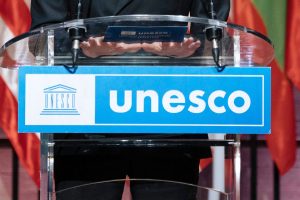PARIS (AP) — UNESCO is slated to have its first director from the Arab world after an Egyptian former tourism and antiquities minister, Khaled el-Anani, was nominated by the agency’s executive board Monday.
If confirmed by UNESCO’s general assembly next month, el-Anani will inherit an agency reeling from the Trump administration’s recent decision to pull the United States out, portending a budget shortfall at the agency best known for its World Heritage sites around the globe.
El-Anani was seen as the front-runner for the position of director-general and won a vote Monday against his only challenger, Firmin Edouard Matoko, an economist from Republic of Congo who promoted schooling in refugee camps.
The decision by the board, which represents 58 of the agency’s 194 member states, is expected to be finalized at a meeting of UNESCO’s general assembly in Uzbekistan next month.
Noble ambitions and persistent problems
In addition to choosing and protecting World Heritage sites and traditions, the Paris-based United Nations Educational, Scientific and Cultural Organization works to ensure education for girls, promotes Holocaust awareness and funds scientific research in developing countries, among other activities. Outgoing UNESCO chief Audrey Azoulay notably led a high-profile effort to rebuild the ancient Iraqi city of Mosul after it was devastated under the Islamic State group.
UNESCO has also long been plagued by accusations of mismanagement and waste.
Trump argues that the agency, which voted in 2011 to admit Palestine as a member, is too politicized and anti-Israel. U.S. supporters of UNESCO, meanwhile, say withdrawing Washington’s support allows China to play an outsized role in the world body.
Meanwhile, the vote comes at a time when the whole 80-year-old U.N. system is facing financial challenges and deepening divisions over the wars in Gaza and Ukraine.
Nominee will be UNESCO’s first Arab leader
El-Anani, 54, worked as a tour guide through ancient Egyptian sites, earned a doctorate in France and became a famed Egyptologist prior to serving in government. He served as minister of antiquities from 2016 to 2019, then led the Ministry of Tourism and Antiquities for two years after the two portfolios were merged.
He is now a university professor, teaching Egyptology in a public university in Cairo.
Arab countries have long wanted to lead UNESCO. The African Union and Arab League are among those that expressed support for his bid.
Egyptian President Abdel Fattah el-Sissi welcomed the news, calling the nomination a ‘’historic achievement that shall be added to Egypt’s diplomatic and cultural record and to the achievements of the Arab and African peoples.”
During his tenure in government, el-Anani oversaw the start of mega-tourism projects including the National Museum of Egyptian Civilization in Cairo, the Jewish Temple and multiple ancient discoveries that helped revive the country’s battered tourism sector.
El-Anani is expected to focus on UNESCO’s cultural programs, and has pledged to continue UNESCO’s work to fight antisemitism and religious intolerance. Israel left UNESCO in 2018.
While he has no U.N. experience, his backers say that could help him make tough reform decisions. He has also said he would try to bring the U.S. back into the UNESCO fold.
Challenger is a UNESCO insider
Firmin Matoko, 69, spent most of his career working for UNESCO, including stints in Rwanda soon after the genocide, during peace negotiations in El Salvador and beyond.
He said he wants UNESCO to focus on technical solutions. He described helping train teachers at a refugee camp in Somalia in the 1990s, and meeting one of them years later after she became education minister.
Both candidates pledged to tap more private sector money to make up for the loss of U.S. and other funding, continuing efforts started under Azoulay.
___
Associated Press writers Angela Charlton in Paris and Samy Magdy and Fay Abuelgasim in Cairo contributed.
By MASHA MACPHERSON
Associated Press

